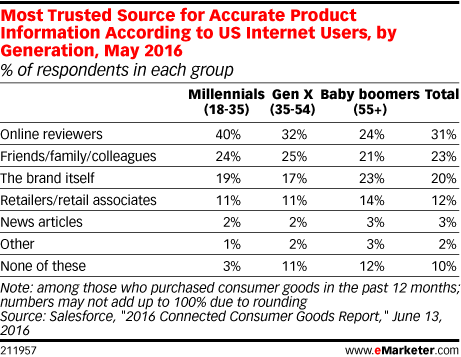Recently, on another sad attempt to try to eat healthy, I got into very dark chocolate. I reasoned that I read (somewhere) that it’s healthy, which would satisfy my need to eat the candy I need to not be sad all the time. But like anything else in the world, the choices were overwhelming.
So I asked a friend who had eaten dark chocolate at least once, she said she likes such-and-such brand, and then I bought some. Consumerism! I’m sure many of you can relate: you buy a brand because someone you trust recommended it.
In fact, according to the 2016 Edelman Trust Barometer, 75% of peers influence purchase decisions at the moment of truth. What’s more, 78% of people trust information created online by friends and family. Note that operative word: online. These days, you don’t even have to nudge the person next to you. Instead, an endorsement on Facebook for “Brand X” is enough to get you to open your wallet.
Trust is in short supply
Meanwhile, brands are reeling due to mistrust and advertisement fatigue by the general population. According to research by Trinity Mirror Solutions and Ipsos Connect, 42% of consumers distrust brands and 69% distrust advertising.
That’s why ad blockers are so prevalent on internet browsers and marketers are scrambling to find different ways to evoke trust to their audience. It’s so bad that we’ve basically come full circle, according to a study by Marketing Sherpa, because print ads are the most trusted form of advertising!
What’s even worse for brands is that their trust levels are even lower with today’s generation of shoppers than before. A 2016 survey by Salesforce showed that while 23% of Baby Boomers trusted the brands themselves to accurately provide product information, only 17% and 19% of Gen Xers and Millennials respectively felt the same way.

Referral marketing confers immediate trust
Of course, this is where referral and affiliate marketing comes in. Since we know that people trust the recommendations of friends and family, and trust the influencers in a specific niche, utilizing this marketing channel can be a quick and effective boost to your brand’s trustworthiness.
We could highlight dozens of stats about the trust conveyed by working with referrers, but it all really comes down to that “boots on the ground” mentality. These days, consumers are trained to believe that brands have an agenda to just make a profit at any cost (which is basically true). Brands have to earn your trust first, in order to have a relationship with you. But with friends, family, and influencers, that’s reversed: you already have a relationship with them, and then you trust their recommendations. And that second way just works a lot better.
But there’s a clear danger here…
Don’t EVER lose brand ambassador credibility
Sure, people may not like a brand’s popup ads or their display ads chasing them around social media. We already know those have a low bar when it comes to trust. But the minute your brand makes a misstep with bad referrals, it’s game over. Regaining trust after that can be nearly impossible.
I didn’t tell you how that dark chocolate story ended. I bought and tried that recommended brand and it was disgusting. Like eating dirt. I don’t think I’m going to trust my friend’s judgement again, at least when it comes to something as important to me as candy.

“Yeah, I’ll find my OWN beard shampoo, thankyouverymuch.”
How do you preserve referral trust? Three simple steps:
Vet your brand ambassadors.
It’s not a great idea to just let anyone become an affiliate of your brand. Choose the right ones, even when it comes to famous influencers, and keep them accountable.
Give referrals a great experience.
While you should treat every customer well, incoming referrals are particularly delicate since they are coming in on the trust of your affiliate. Treat them poorly and you not only damage your brand, but the reputation of that affiliate.
Be excellent at customer service.
It’s the core of good online reviews.



